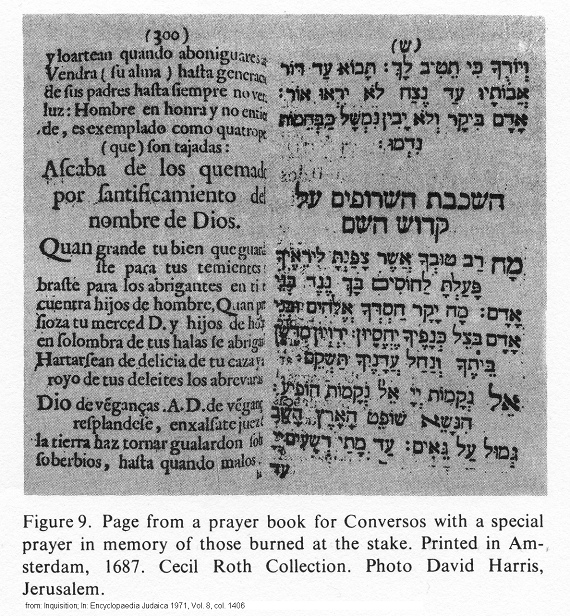Encyclopaedia Judaica
Persecution of the Jews: The Inquisition of the church against the Jews 1481-1834
How criminal Catholic "Christian" church and the criminal Pope justified anonymous allegations against the Jews and New Christians with torture, degradation, and burning - and confiscation of the property
from: Inquisition; In: Encyclopaedia Judaica 1971, vol. 8
presented by Michael Palomino (2007)
| Teilen / share: |
Facebook
|
|
Twitter
|
|
|
|
The Inquisition in the Spanish Colonies
17. The Inquisition in the colonies of Spain: Canary Islands 1504-1820
[Inquisition at Las Palmas since 1504]
<THE CANARY ISLANDS. In the Spanish possessions nearer Europe the presence of the Conversos was no less marked. In the Canary Islands, an episcopal Inquisition was set up to deal with them as early as 1499. As a result of its enquiries, there were discovered to be on the islands a number of secret Jews, and even a secret synagogue. A branch of the Inquisition of Andalusia was accordingly set up at Las Palmas in 1504.
Autos-de-fé, at which a few individuals were penanced or reconciled, were held in 1507 and 1510. In 1526, however, the tribunal was very active, eight individuals being relaxed in person, two reconciled, and two penanced. Of these over one half, including six of the eight relajados, were accused of Judaizing.
Further autos-de-fé, at which however no persons were relaxed, were held in 1530 and 1534. This outburst of activity seems to have temporarily eradicated crypto-Judaism in the islands, only four New Christians figuring in the sporadic prosecutions which continued till 1581 and none at all thereafter until 1597, when all activity temporarily came to an end.
[since 1600 approx.: Flight of Conversos from the Peninsula to the Canary Islands - since 1620 approx.: Flight to Holland and England - edict of faith 1625]
The immigration of Conversos from the Peninsula, however, at the opening of the 17th century, stirred it to some fresh activity. In 1625 an edict of faith against Judaism was issued, and the information received in consequence revealed the presence of a whole colony of secret Jews. A considerable proportion of them, however, had already fled, and, owing partly to this and partly to political considerations, no prosecutions ensued.
Numerous denunciations of the Converso refugees in London and Amsterdam continued to be made down to the middle of the century, but no further proceedings were taken against them.
[Abolition of the Inquisition in 1813 - reinstated 1814-1820]
The tribunal, which for a prolonged period had not occupied itself with Judaizers, was abolished with that of Spain in 1813, but reinstated in spite of popular hostility from 1814 to 1820, when it was finally suppressed.> (col. 1396)
|
|
|
^




